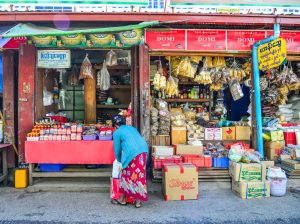Nearly a year after the coup that overthrew Myanmar’s elected civilian government, the outlook for the country’s economy remains grim, with the World Bank predicting an anemic growth rate of 1 percent this fiscal year.
In its latest Myanmar Economic Monitor, released yesterday, the World Bank estimated that Myanmar’s economy shrank 18 percent in the fiscal year ending September 2021, and predicated that political instability and the COVID-19 pandemic will prevent any rapid rebound.
“While reflecting recent signs of stabilization in some areas, the projection remains consistent with a critically weak economy,” the World Bank said in a press release accompanying the report. “Economic activity continues to be affected by substantial weaknesses in both supply and demand. Firms continue to report sharp reductions in sales and profits, cash-flow shortages, and a lack of adequate access to banking and internet services.”
Remarkably, the World Bank wrote that the country’s economy is around 30 percent smaller than it would have been absent the coup and the COVID-19 pandemic.
Myanmar’s economic Great Leap Backward has formed the flipside to the disastrous political situation that has resulted from last February’s coup. Since then, the security forces have killed close to 1,500 people, according to the Assistance Association for Political Prisoners, and displaced tens of thousands in their attempt to consolidate the coup and wipe out the growing armed resistance to the military administration.
The economic challenges have ranged across the full spectrum, from the imposition of sanctions by Western countries and the withdrawal of major international investors (the latest of which was Australia’s energy firm Woodside) to a sharp spike in unemployment, a collapse in the value of the kyat currency, and the impacts of prolonged internet blackouts. For Myanmar companies, all of these have led to “sharp reductions in sales and profits, cashflow shortages, and a lack of adequate access to banking and internet services,” the World Bank noted.
The Myanmar Economic Monitor also predicts that the share of Myanmar’s population living in poverty has doubled compared to pre-COVID-19 levels. “Ongoing economic pressures are having a substantial effect on vulnerability and food security, particularly for the poor, whose savings have been drained as a result of recent shocks,” it stated.
The World Bank report came the same day that the United States issued a formal business advisory for Myanmar, warning of the heightened risks associated with doing business in the country. The advisory emphasized – probably unnecessarily – the reputational and legal risks of doing business and utilizing supply chains under Myanmar military control, particularly in any enterprises related to gems and precious metals, real estate and construction, and arms and military equipment.
“The coup and subsequent abuses committed by the military have fundamentally changed the direction of the economic and business environment in Burma,” the advisory said. This has “result[ed] in a more opaque business environment in which the military can draw from multiple sources of revenue to support its operations without civilian oversight.”
Like a similar advisory about Cambodia that was released in November, Washington’s warning about corruption and reputational risk will not come as news to anyone invested in Myanmar, but it does offer hints at the possible next step in the U.S. sanctions campaign against the junta.
In a commentary on the new advisory, the US-ASEAN Business Council (USABC) noted that Washington also highlighted the risk of doing business with state-owned enterprises, all of which fell under military control after the coup. In particular, it explicitly mentioned a number of enterprises, including Myanma Posts and Telecommunications (MPT) and the Myanma Oil and Gas Enterprise (MOGE), and said that the business community “should further review and, as appropriate, consider updating their risk assessments associated with continuing to do business” with these enterprises.
While entities directly linked to the military have already been hit with Western sanctions, many state-owned enterprises, including MOGE, which provides the bulk of Myanmar’s foreign earnings and which activists say should be the next target for sanctions, have so far escaped such treatment.
However, the USABC interpreted the inclusion of these enterprises in the advisory as a sign that the U.S. may no longer acknowledge a distinction between state-owned and military-owned entities and enterprises, since “all State revenues become military revenues with no real checks, balances, or oversight.” It therefore predicted that “future USG actions against more SOEs… could be forthcoming.”

































